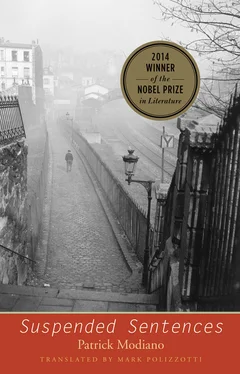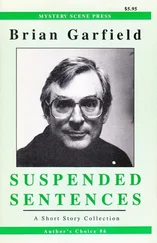Up ahead, a light went on in the bow window of the living room. Roger Vincent’s American car was parked in front of the house. That evening, he’d come with Andrée K., “the wife of the big-shot doctor,” the one who’d been part of the Rue Lauriston gang and who used tu with Roger Vincent. It wasn’t nine-thirty yet, but Annie emerged from the house, her light blue dress belted at the waist. We crossed the avenue again, as fast as possible, crouching low, and hid behind the bushes of the wooded area next to the Protestant temple. Annie came closer. Her blond hair formed a stain on the twilight. We could hear her footsteps. She was trying to find us. It was a game we played. Each time, we hid in a different spot, in the abandoned lot that the trees and vegetation had taken over. She always ended up finding our hiding place, because we would break out in hysterical laughter when she got too close. The three of us went back to the house. She was a child, like us.
Some sentences remain etched in your mind forever. One afternoon there was a kind of fair in the yard of the Protestant temple, across from the house. From our bedroom window, we had a plunging view of the little stalls around which children crowded with their parents. At lunch, Mathilde had said to me:
“How would you like to go to the festival at the temple, blissful idiot?”
She took us. We bought a lottery ticket and won two packets of nougat. On the way back, Mathilde said:
“They let you in because I’m a Protestant, blissful idiot!”
She was stern as ever, wearing her cameo and black dress.
“And let’s get one thing straight: Protestants see everything! There’s nothing you can hide from them! They don’t only have two eyes — they also have one in the back of their heads! You got that?”
She pointed to her bun.
“You got that, blissful idiot? An eye in the back of our heads!”
From then on, my brother and I felt nervous in her presence, especially when we were passing behind her back. It took me a long time to realize that Protestants were just like anyone else and not to cross the street when I saw one coming.
Never will another sentence have the same resonance for us. It was like Roger Vincent’s smile: I’ve never met one like it. Even in Roger Vincent’s absence, that smile floated in the air. I also remember a sentence that Jean D. said. One morning, he had taken me on his motorcycle up to the Versailles road. He wasn’t going too fast, and I held on to his Canadienne. On the way back, we stopped at the Robin des Bois inn to buy some cigarettes. The manageress was alone at the bar, a very pretty young blonde who wasn’t the one my father had known, back when he’d frequented the inn with Eliot Salter, the marquis de Caussade, and perhaps with Eddy Pagnon.
“A pack of Baltos,” Jean D. said.
The manageress handed him the pack of cigarettes, flashing both of us a smile. When we left the inn, Jean D. said to me in a serious voice:
“You know, old man … Women … They seem great from a distance, but up close, you’ve got to watch yourself.”
He suddenly looked very sad.
One Thursday we were playing on the knoll near the chateau. Little Hélène was watching us, sitting on the bench where Snow White normally sat. We climbed up the branches of the pine trees. I had climbed too high and, while moving from one branch to the next, I nearly fell. When I climbed down from the tree, Little Hélène was pale as a ghost. That day she was wearing her riding breeches and her mother-of-pearl bolero jacket.
“That wasn’t smart … You could have been killed!”
I had never heard her use such a harsh tone.
“Don’t ever do that again!”
I was so unused to seeing her angry that I felt like crying.
“I had to give up my career because of a stupid stunt like that.”
She took me by the shoulder and yanked me to the stone bench under the trees. She made me sit down. She took a crocodile-skin wallet from the inside pocket of her bolero jacket — the same color as the cigarette case Annie had given me, presumably from the same store. And from that wallet, she extracted a piece of paper and handed it to me.
“You know how to read?”
It was a newspaper clipping with a photo. I read the headline: TRAPEZE ARTIST HÉLÈNE TOCH IN SERIOUS ACCIDENT. MUSTAPHA AMAR AT HER BEDSIDE. She took back the clipping and returned it to her wallet.
“Accidents can happen very suddenly in life … I used to be like you — clueless … I was very trusting.”
She seemed to have second thoughts about talking to me in such an adult way.
“Come on, let’s go have a snack. We’ll get something at the pastry shop …”
All along Rue du Docteur-Dordaine, I hung back a bit to watch her walk. She had a slight limp. It had never occurred to me before then that she hadn’t always limped. So, accidents could happen in life. That revelation troubled me deeply.
The afternoon when I’d gone to Paris alone in Annie’s 4CV and she had given me the crocodile cigarette case, we had eventually found our way through the small streets, now demolished, of the seventeenth arrondissement. We followed the quays along the Seine, as usual. We stopped for a moment on the riverbank near Neuilly and the Ile de Puteaux. From the top of the wooden stairs that led to the light-colored pontoons, we gazed over the floating houses and barges converted into apartments.
“We’re going to have to move soon, Patoche … And this is where I want to live …”
She had already mentioned this to us, several times. We were a bit worried at the prospect of leaving the house and our town. But to live on one of those barges … Day after day, we waited to set off on this new adventure.
“We’ll make a room for the two of you. With portholes … We’ll have a big living room and a bar …”
She was musing aloud. We got back into the 4CV. After the Saint-Cloud tunnel, on the highway, she turned toward me. She looked at me with eyes that shone even brighter than usual.
“You know what you should do? Every evening, you should write down what you did that day. I’ll buy you a special notebook …”
It was a good idea. I stuck my hand in my pocket to reassure myself I still had the cigarette case.
Certain objects disappear from your life at the first lapse in attention, but that cigarette case has remained. I knew it would always be within reach, in a nightstand drawer, on a shelf in a clothes closet, at the back of a desk, in the inner pocket of a jacket. I was so sure of it, of its presence, that I usually forgot all about it. Except when I was feeling down. Then I would ponder it from every angle. It was the only object that bore witness to a period of my life I couldn’t talk to anyone about, and whose very reality I sometimes doubted.
Still, I almost lost it one day. I was in one of those schools where I bided my time until the age of seventeen. My cigarette case caught the eye of two twin brothers from the upper bourgeoisie. They had loads of cousins in the other grades, and their father bore the title “top marksman in France.” If they all banded against me, I wouldn’t stand a chance.
The only way to escape them was to get myself expelled as fast as possible. I ran away one morning, and I took the opportunity to visit Chantilly, Mortefontaine, Ermenonville, and the Abbey of Chaalis. I returned to school at dinnertime. The principal announced my expulsion but he couldn’t reach my parents. My father had left for Colombia some time before, to check out a silver mine a friend had told him about; my mother was on tour near La Chaux-de-Fonds. They quarantined me in a room in the nurse’s station until someone could come collect me. I wasn’t allowed to go to class or take my meals in the dining hall with my schoolmates. This kind of diplomatic immunity kept me safe from the two brothers, their cousins, and the top marksman in France. Every night before going to sleep, I verified the presence under my pillow of the crocodile cigarette case.
Читать дальше












